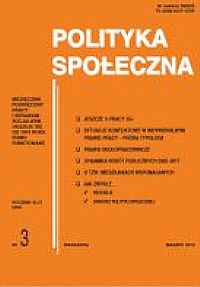
- Social policy in action (1-3)
The author focuses on the links between economic and social policy, emphasizing that these links are not unidirectional and social policy is not constrained by some type of economic determinism. The second thread of the text is a presentation and argumentation in favor of the thesis that "strategic" decisions should also be considered at the level of their effects on social policy in the sectoral or sectoral dimension. Finally, the author emphasizes that the practical form of social policy, especially the policy on shaping the income structure of households, are decisions taken at the enterprise level.
- Premises for using immediate social assistance (3-7)
The authors start with a statement saying that in the early 1980s the number of people using social benefits doubled in the Łódź Voivodeship. This group of people consists mainly of pensioners who receive adequate benefits at a minimum level, which pushes them below the poverty line. The authors also point out that one of the key factors shaping the well-being of people aged 70-74 is the feeling of loneliness, often felt more severely than the feeling of poverty.
- Disabled people in Polish society (7-9)
In the first part of the article, the author presents the general concept of a research project devoted to the situation of disabled people and their families in Polish society, implemented since 1993 under the auspices of the Polish Academy of Sciences. The second part of the text indicates the growing participation of disabled people in Polish society and the increasing difficulties of their social integration. The author also points out that the population of people with disabilities is a "risk population" associated with various social problems.
- Job creation and economic restructuring (10-16)
The article is not only a summary of the international conference organized under the auspices of Minister of Finance Leszek Balcerowicz and Minister of Labor Longin Komołowski on October 23-24, 1998 in Warsaw. It also contains comments and reflections of the author, who was its co-organizer and active participant. Thematic scope of the text covers the basic issues of labor market development in the context of economic problems after a decade of Polish transformation. The issues discussed concerned topics such as: labor market flexibility, employee mobility, qualification of labor resources and education-related challenges, motivating and protecting remuneration (minimum wage) policies and social benefits conducive to restructuring, increasing the importance of local government policy regional and directions of transformation of two special sectors of the Polish economic structure: mining and agriculture.
- Social policy in the accession treaty on Poland's accession to the European Union (16-24)
The author discusses the complexity of negotiations related to Poland's accession to the EU, in particular the issues of Annex XII, in which - in Title 13 - the basic issues of regulations concerning social policy were discussed. The text also notes that the provisions of the Treaty in this area should be linked to other indicated documents that accompany it, especially in areas such as job security, social dialogue, and equal conditions of access to employment for women and men and equal pay etc.
- Formalization of activities of social organizations (24-27)
The author focuses on the consequences of the new provisions regulating the functioning of non-governmental organizations (2003), and especially the part thereof which determines the conditions of financial transparency of their activities. The basic thesis of the text says that meeting these conditions - without which it is difficult to think about building social trust for organizations of the third sector - requires far-reaching professionalisation of their activities, which for many of them may constitute a serious economic and organizational barrier.
- About employment of foreigners from third countries in Poland (27-32)
In the years 2007–2008, Poland significantly liberalized its immigration policy. This was to increase employment of foreigners in Poland so that they would fill the labor market shortages. The article analyzes changes in the scale of employment of foreigners that took place in the years 2008–2012. Data from the Ministry of Labor and Social Policy and the Social Insurance Institution were used for this. On this basis, the changes introduced and their effectiveness were assessed. The article also includes recommendations whose application would increase the effectiveness of Polish immigration policy.
Polityka Społeczna (Social Policy) - full list







